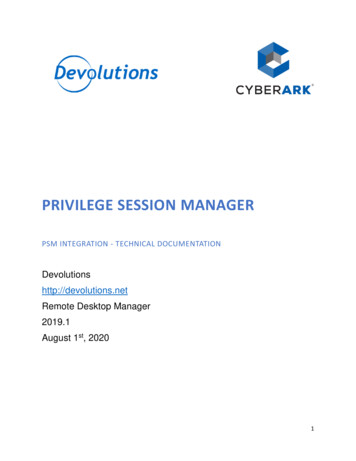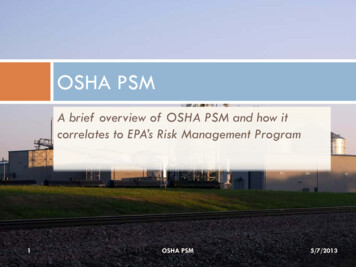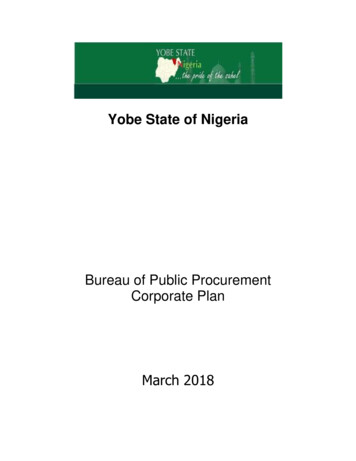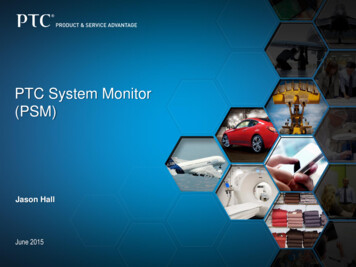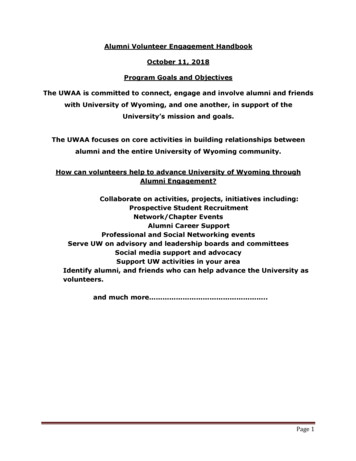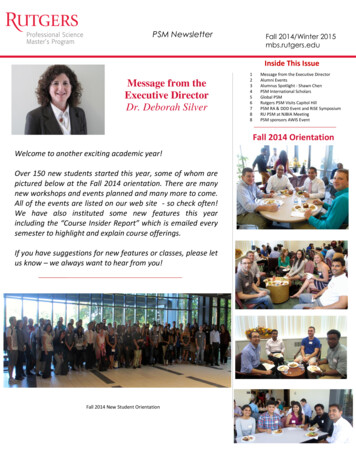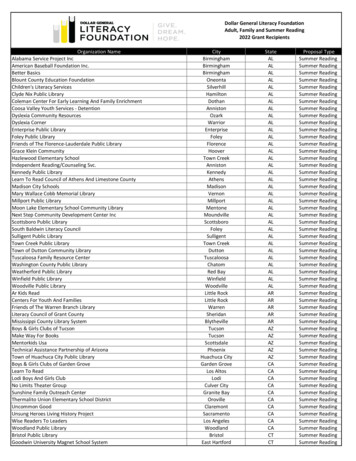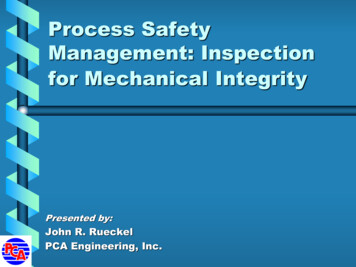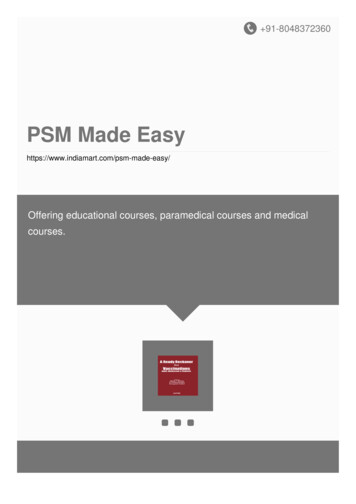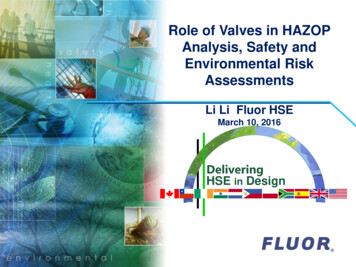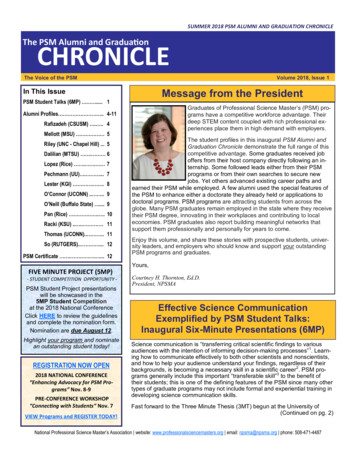
Transcription
SUMMER 2018 PSM ALUMNI AND GRADUATION CHRONICLEThe PSM Alumni and GraduationCHRONICLEThe Voice of the PSMVolume 2018, Issue 1Message from the PresidentIn This IssuePSM Student Talks (6MP) . 1Graduates of Professional Science Master’s (PSM) programs have a competitive workforce advantage. Theirdeep STEM content coupled with rich professional experiences place them in high demand with employers.Alumni Profiles . 4-11Rafizadeh (CSUSM) . . 4Mellott (MSU) 5Riley (UNC - Chapel Hill) . 5Dalilian (MTSU) . 6Lopez (Rice) . . 7Pechmann (UU) . . 7Lester (KGI) . . 8O’Connor (UCONN) . . 9O’Neill (Buffalo State) . 9Pan (Rice) . . 10Racki (KSU) . . . 11Thomas (UCONN). . 11So (RUTGERS). . 12PSM Certificate . . . 12The student profiles in this inaugural PSM Alumni andGraduation Chronicle demonstrate the full range of thiscompetitive advantage. Some graduates received joboffers from their host company directly following an internship. Some followed leads either from their PSMprograms or from their own searches to secure newjobs. Yet others advanced existing career paths andearned their PSM while employed. A few alumni used the special features ofthe PSM to enhance either a doctorate they already held or applications todoctoral programs. PSM programs are attracting students from across theglobe. Many PSM graduates remain employed in the state where they receivetheir PSM degree, innovating in their workplaces and contributing to localeconomies. PSM graduates also report building meaningful networks thatsupport them professionally and personally for years to come.Enjoy this volume, and share these stories with prospective students, university leaders, and employers who should know and support your outstandingPSM programs and graduates.Yours,FIVE MINUTE PROJECT (5MP)- STUDENT COMPETITION OPPORTUNITY -PSM Student Project presentationswill be showcased in the5MP Student Competitionat the 2018 National ConferenceClick HERE to review the guidelinesand complete the nomination form.Nomination are due August 12.Highlight your program and nominatean outstanding student today!REGISTRATION NOW OPEN2018 NATIONAL CONFERENCE“Enhancing Advocacy for PSM Programs” Nov. 8-9PRE-CONFERENCE WORKSHOP“Connecting with Students” Nov. 7VIEW Programs and REGISTER TODAY!Courtney H. Thornton, Ed.D.President, NPSMAEffective Science CommunicationExemplified by PSM Student Talks:Inaugural Six-Minute Presentations (6MP)Science communication is “transferring critical scientific findings to variousaudiences with the intention of informing decision-making processes”1. Learning how to communicate effectively to both other scientists and nonscientists,and how to help your audience understand your findings, regardless of theirbackgrounds, is becoming a necessary skill in a scientific career 2. PSM programs generally include this important “transferable skill”3 to the benefit oftheir students; this is one of the defining features of the PSM since many othertypes of graduate programs may not include formal and experiential training indeveloping science communication skills.Fast forward to the Three Minute Thesis (3MT) begun at the University of(Continued on pg. 2)National Professional Science Master’s Association website: www.professionalsciencemasters.org email: npsma@npsma.org phone: 508-471-4487
SUMMER 2018 PSM ALUMNI AND GRADUATION CHRONICLEPSM STUDENT TALKS (6MP) (cont. from pg. 1)Queensland in 2008 to build students’ “academic, presentation, and research communication skills”4. The 3MT competition concept has grown widely and is now a multinational event in universities around the world, now joined by other well-established programs such as Ignite Purpose or Pecha Kucha. All are designed to foster communication skills and encourage research presentations in a short and concise manner using non-technical terms to keep audiences engaged.Many universities across the US offer variants of the 3MT emphasizing research and scientific communication skills.The 2017 National Professional Science Masters’ annual conference in Phoenix, Arizona featured for the first time inNPSMA history, an innovative science communication session, the Six-Minute Presentation (6MP). The 6MP providedan opportunity for PSM students to effectively explain completed capstone/internship projects to conference attendees,an intelligent but non-specialist audience. Students chosen to participate were asked to give a lively 6-minute presentation using no more than six slides. Presentations also included reasons for choosing specific projects, the relevance andapplication of the project outcomes to both student and organization goals, and the connection between successful completion of projects and training received in their PSM programs.Anya Hunter (6MP Second Place Winner), graduated from Colorado State University in the spring of 2018 with a Professional Science Master's Degree in Zoo, Aquarium and Animal Shelter Management. She is currently working at theWoodland Park Zoo in Seattle, Washington, as their Volunteer Engagement CoordinatorCarnivores spend a great portion of their time in the wildacquiring and consuming food. This time consuming andphysically wide-ranging activity is difficult to replicate incaptivity. This study tested the behavioral outcomes offeeding social carnivores different forms of food. The aimof the study was to see if different forms of food changedactivity levels and if it affected kinship relationships withinthe animal’s social groups. Implementing this feeding enrichment program increased activity levels and behavioraldiversity in captive social carnivores, while allowing them todevelop the stronger social bonds that are necessary foroverall animal welfare quality.Molly Corder (6MP First Place Winner), graduated fromColorado State University in the spring of 2018, earning a Professional Science Master's Degree in Zoo, Aquarium andAnimal Shelter Management. Molly is spending this summer completing internships at the Denver Zoo and SmithsonianGlobal Health Program, and traveling in Europe. She has accepted positions with the Smithsonian Conservation BiologyUnit and with George Mason University where she will pursue her doctorate in Environmental Science and Public Policy,with a research focus on endangered species reproduction and conservation medicine.Assisted reproductive techniques such as artificial insemination (AI), gamete and embryo cryopreservation and estrus synchronization are routinely used to improve reproductive success in the agricultural livestock industry.These assisted reproductive techniques have been modified to aid in the preservation of endangered hoof stockspecies but are still not widely used. Such efforts will beparamount in the preservation of several of the world’smost valuable species. This project focused on the use offecal hormone analysis to document the length of the estrous cycle and assess the synchronization protocol. Expected outcomes for include applications in global anoapopulations under managed care. The long-term goal is todevelop an assisted reproductive protocol that providesreliable and consistent results.(Continued on pg. 3)National Professional Science Master’s Association website: www.professionalsciencemasters.org email: npsma@npsma.org phone: 508-471-44872
SUMMER 2018 PSM ALUMNI AND GRADUATION CHRONICLEPSM STUDENT TALKS (6MP) (cont. from pg. 2)Caryn Massey, a student at Northern Arizona University, expects to graduate in August of 2018 with a ProfessionalScience Master’s Degree in Climate Science and Solutions. She is currently completing research as a Junior ResearchFellow at the Universidad De Concepcion in Chile before seeking a job.Many corporations want to limit their influence on climatechange by setting a greenhouse gas emissions reductiontarget that is line with climate science, but they are notsure how. Using learned skills such as database management, and greenhouse gas inventories and weavingtogether a business background with technical scienceskills, this project worked on developing unique solutionsto some of the world’s most pressing economic problems.Fatemeh Dalilian, graduated from Middle Tennessee State University in Dec. 2017 with a Professional Science Master’s Degree in Engineering Management. She plans to pursue her Ph.D.The business objective of the Plan for Every Part (PFEP)is reducing sacrificed productivity by having a controlledinventory reduction and eliminating material shortages atthe same time.PFEP project steps included collecting required data aboutevery part, calculating replenishment frequency based onhistorical data for each part, calculating optimized quantityfor these parts based on analyzed data, giving recommendations to improve current state and finally, implementingthe recommendations. The project resulted in eliminationof three lineside racks and more than fifteen percent inventory reduction on the line.Brigitte Lim graduated from Arizona State University in December 2017 with a PSM degree in Solar Energy Engineering and Commercialization. She also won the Sustainable Development Solutions Network Youth Special Prize in the2017 Geneva Challenge. Brigitte is now back in the Phillipines where she works as a Business Development Officer forJapan Solar.The Philippines is a tropical country in South East Asiawhose installed solar photovoltaic (PV) capacity hasgrown from 1 megawatt (MW) in 2013 to approximately765 MW in 2016. This opens the opportunity for a SolarNetwork for Energy Education and Employment (SolarN3E). The capstone project presents a business plan forSolar N3E, a Philippines-based enterprise that utilizes theongoing government funded Sustainable Livelihood Program, and opportunities in the reformed national education system, to develop human capacity and employmentopportunities for the growing solar energy industry.(Continued on pg. 5)National Professional Science Master’s Association website: www.professionalsciencemasters.org email: npsma@npsma.org phone: 508-471-44873
SUMMER 2018 PSM ALUMNI AND GRADUATION CHRONICLEPSM STUDENT TALKS (6MP) (cont. from pg. 3)In conclusion, participants at 6MP enhanced their communication skills and messaging abilities. These competenciesshould serve them well in teamwork and reporting in their work environments, and in garnering leadership and financialsupport for future projects and initiatives. Participation in the 6MP benefits all participants, even if they are not awardwinners. Future NPSMA annual conferences will continue to offer a similar competition. For more information on howyour students can participate in this exciting program at the 2018 NPSMA Annual Conference in Arlington, VA, click onthis link 0Natl%20Conf/2018-NPSMA-5MP-Guidelines.docx.1Eise, Jessica. (2016). Science communication vs. communication. Retrieved from: cation/.2Urpa, Lea (2017). Good Science Communication: Benefits for the Audience and the Scientist. Retrieved from ion-benefits-audience-and-scientist.3Strausbaugh, Linda, & Harkins, Heidi. (2017). 20 Years and Counting: How has PSM Training in “Transferable Skills” changed?. The Innovator.Retrieved from efault/files/the innovator curated issues fall 2017 vol 10 issue 3.pdf.4The University of Queensland, Australia (Updated March, 2018). Three Minute Thesis. Retrieved from ted by Ramona Mellott, PhD, Dean and Professor at Northern Arizona University served on the Board of Directors forNPSMA (2015-2017). She also chaired the 2017 conference program committee for the 8 thAnnual Conference of the NPSMA held inPhoenix, Arizona in November 2017 and conceived the original idea of the 6MP competition. Special thanks to Dr. Jennie Willis,PSM Program Coordinator at Colorado State University, who provided valuable assistance in the development of the inaugural6MP program and to our judges, NPSMA President-Elect Scott Herness, NPSMA Associate Vice President Deborah Silver, Commission Faculty Director Jim Sterling, and Commission Steering Committee Co-Chair Michael Teitelbaum. Finally, thanks to student contestants and their PSM program directors for willingness to participate.Alumni ProfilesTANNAZ RAFIZADEHMASTER OF BIOTECHNOLOGY: A PROFESSIONAL SCIENCE MASTER’S (2017)CALIFORNIA STATE UNIVERSITY SAN MARCOSThe Knowledge and Skills to Broaden a CareerWhen Tannaz Rafizadeh was looking for a graduate biotechnology program, she learned that most schools had completed their application process for the year. However, not only was CSUSM still accepting applications to the Master ofBiotechnology: A Professional Science Master’s degree, it offered a distinct program as well. Rafizadeh was intrigued bythe opportunity to pursue advanced study in science and to develop high-level business skills that would boost her career prospects.The cohort system, in which students advance through the program as a group, was of particular interest to Rafizadeh,who had moved from Tehran, Iran, to the United States in 2014. “Having class with the same people for two years wewere a community,” Rafizadeh says.Through the program’s semester-in-residence—where students work in a life sciences business to address a scientificissue, project or problem—Rafizadeh combined her new interest in business with her scientific expertise at BioLegend inSan Diego. Not only did she conduct research and testing as part of the product development process, she also performed a marketing analysis of the product being developed.The semester-in-residence led to the first step in her new career in the United States. BioLegend hired Rafizadeh beforeshe graduated, first part time and finally as a full-time research associate in product development.“If you want to work in industry, you need to know about accounting and you need to know about marketing and otherskills,” Rafizadeh says of the business proficiencies she added to her résumé. “You may learn those skills in industry,but we learned them before even going into industry.“I think differently from my co-workers,” she adds. “And I know I have the knowledge and the skills to broaden my career.I think this will open opportunities for me in the future.”Contributed by Al Kern, former director of CSUSM PSM Program in Biotechnology.National Professional Science Master’s Association website: www.professionalsciencemasters.org email: npsma@npsma.org phone: 508-471-44874
SUMMER 2018 PSM ALUMNI AND GRADUATION CHRONICLERYAN MELLOTTPROFESSIONAL SCIENCE MASTER’S IN INDUSTRIAL MATHEMATICS (2003)MICHIGAN STATE UNIVERSITYBusiness Training for Solving Real-World ProblemsWhen Ryan Mellott applied to the PSM in Industrial Mathematics (Master of Science inIndustrial Mathematics or MSIM) program at Michigan State University, he wished to avoida doctoral program and focus on an early entry to industry. Ryan’s primary goals were togain mathematical and statistical skills, and business training for solving real-world problems.Ryan points to professional development beyond the MSIM disciplinary curriculum as being key to his journey to industrysuccess. The rigor of weekly assignments in his first industrial math core course was substantially more demanding thanother courses. This helped Ryan understand and develop the work ethic that was required to pass his sequence of actuarial exams. The industrial project required in the second MSIM core course provided valuable insight into industry andadded highlights to his resume. His delivery of the high-quality project reports (e.g., content, clarity, design, and formatting) expected in the MSIM PSM program directly carried over to his earliest days of career and set Ryan apart as ahighly effective communicator.Ryan’s career path at Jackson National Life Insurance Company has been successful and rewarding. Through his workethic and commitment to developing expertise in his discipline, Ryan transitioned from an intern position to Head ofProduct Development within an impressive six-year window. His role in continually providing enterprise-wide value andtaking on increasing responsibilities has been unique and excellent. He currently holds the title of Vice President, Actuarial, and continues to lead the product design and pricing function for Jackson, in addition to leading/supporting a widerange of activities.Ryan continued to keep in touch with the MSIM program where he serves on the Industrial Advisory Board. He has attended social occasions within the program and provided career advice to students on how they can jump start a successful industrial career by leveraging their talents and the skills developed through the PSM program.Contributed by Peiru Wu, Director, PSM in Industrial Mathematics, MSU.MEGAN RILEYMASTER OF PROFESSIONAL SCIENCE IN TOXICOLOGY (2016)UNIVERSITY OF NORTH CAROLINA, CHAPEL HILLA PSM Degree Enhances a Ph.D. DegreeMegan Riley earned her doctoral degree in biological sciences from the University of South Carolina. While there, sherealized that her true passion was toxicology and she started reviewing programs that would allow her to apply her background in biology to her newfound research interest. She was attracted to the University of North Carolina at ChapelHill’s Master of Professional Science in Toxicology for its strong science-based coursework, emphasis on real-worldbusiness skills and the strategic location of Research Triangle Park.(Continued on pg. 6)National Professional Science Master’s Association website: www.professionalsciencemasters.org email: npsma@npsma.org phone: 508-471-44875
SUMMER 2018 PSM ALUMNI AND GRADUATION CHRONICLEMEGAN RILEY (cont. from pg. 5)Although many students enrolled in UNC-Chapel Hill’s three PSM programs do not have an advanced degree, Dr. Rileyrecognized the many benefits of the PSM for individuals with graduate degrees. “From persuasive presentations tostakeholder management, the business acumen I gained from these classes has given me an edge, bolstered my confidence and prepared me to succeed in my career beyond graduate school,” she said.After earning her PSM degree, Dr. Riley joined GlaxoSmithKline as a member of the Future Leaders Program, an initiative designed to introduce promising recent advanced-degree graduates to the pharmaceutical industry. She currentlyserves as a Clinical Research and Development Epidemiologist at the GSK Vaccines US Research & DevelopmentCenter, where she designs and oversees clinical trials for a vaccine candidate for pregnant women to protect newbornsfrom a disease that often occurs in early infancy.Dr. Riley credits much of her professional success to skills such as critical thinking, problem solving and professionalcommunication, which she gained through UNC-Chapel Hill’s PSM coursework. “I would strongly encourage all studentsinterested in a non-academic STEM career to take advantage of this program,” she said.Contributed by Katja Greeson, Graduate Assistant, Professional Science Master's and Graduate Certificate in BusinessFundamentals.FATEMEH DALILIANMASTER OF SCIENCE IN PROFESSIONAL SCIENCES: ENGINEERINGMANAGEMENT (2017)MIDDLE TENNESSEE STATE UNIVERSITYPSM Graduate Improves Manufacturing TechniquesWhen your internship company offers its lawyers to help ensure that you can secure your work visa and keep workingthere after graduation, you must be doing something right.That’s what happened with Middle Tennessee State University (MTSU) Master of Science in Professional Science(MSPS) recent graduate Fatemeh Dalilian. Fatemeh’s MSPS concentration was Engineering Management, which prepares students for leadership careers in manufacturing and industry. The degree program includes Project Management, Six Sigma, and lean manufacturing, and most students graduate with certifications in all three. These studentsalso take our MSPS Business Core courses–primarily taught by faculty in the Jones College of Business at MTSU–which include management classes such as Leadership and Motivation, Managerial Communication, and the capstoneInternship course. For the MSPS program, students must complete a complex, minimum 250-hour internship in industryat the end of their studies.Ms. Dalilian secured her capstone internship at Schneider Electric, a multinational energy management company with amanufacturing facility in nearby Smyrna, TN. There, she successfully implemented Six Sigma and lean manufacturingtechniques to simultaneously reduce assembly inventory while eliminating shortages on the line. Her work and professionalism was given top marks by her manager. As Fatemeh was an international student, several visa issues aroseafter she completed her internship which required some extensive paperwork to allow her to remain and work forSchneider. Because of her great work as an intern, the company provided legal support to guarantee that she could stillwork there after graduating.In November 2018, Ms. Dalilian competed in the 6-minute Project Presentation (6MP) at the NPSMA Annual Conference. The MSPS program is extremely proud of her, and we know that she will go on to do great things (and make lotsof money)!Contributed by Saeed Foroudastan, Program Director and Associate Dean.National Professional Science Master’s Association website: www.professionalsciencemasters.org email: npsma@npsma.org phone: 508-471-44876
SUMMER 2018 PSM ALUMNI AND GRADUATION CHRONICLECASSIE LOPEZPROFESSIONAL MASTERS IN SCIENCE AND ENGINEERING:ENVIRONMENTAL ANALYSIS (2013)RICE UNIVERSITYPSM Graduate Named Top Young ProfessionalCassandra (Cassie) Lopez, a native Houstonian, graduated from Rice University with a BAin Environmental Engineering Sciences (2011) and accepted employment with Burns andMcDonnell as a project Environmental Specialist.To enhance her career she decided to continue her education by joining the Professional Science Master’s Program inEnvironmental Analysis at her alma mater Rice University. During her studies she was not only able to advance her science and engineering knowledge but also enrich her education by taking management and business courses giving herthe edge when Chevron picked her as an intern to fulfill the required work experience of the program. After graduation in2013, Chevron Corporation offered her a full-time position in the Health, Safety, and Environmental (HES) function as aCompliance Assurance Specialist, and since 2015, Cassie has been working as HES Specialist for the Deep Watergroup at Chevron supporting both onshore and offshore developments for North America Exploration & Production.In addition to her professional career, Cassie is passionately involved in community activities serving as Club Presidentfor the Downtown Houston Toastmasters Club (2016-2017) and engaging and mentoring current Rice PSM students inLunch and Learns. She has been invited as featured guest speaker to the Federation of Houston Professional Women,she also represented the Rice program at Houston’s 2018 CERA Week Conference, and was a member of the OffshoreTechnology Conference (OTC) Networking Committee for 2018. During her assignment there she also made time tomeet up with the Professional Science Master’s team at the Rice University booth at the OTC.Cassie is a 2017 recipient of the top young professionals “30 Under 40” recognition by the area’s Leader News, and welook forward to many more challenges this amazing and energized Rice PSM alumni will tackle in the future.Outside of her successful career, Cassie is also married and in spring 2018 she gave birth to her first born, Gabe. Cassie loves to be active and has participated with her husband in triathlons and other challenging fitness events.She is very excited to continue her involvement with Rice University, the Environmental Analysis program, its studentsand the Houston community.Contributed by Dagmar Beck, Director Professional Masters in Science and Engineering.JESSICA MARY PECHMANNPROFESSIONAL MASTERS OF SCIENCE AND TECHNOLOGY:ENVIRONMENTAL SCIENCE TRACK (2017)UNIVERSITY OF UTAHA Love of Geographic Information System Technology Leads to a PSMand International CareerJessie became interested in GIS long before graduating from the PMST Program’s Environmental Science track with anemphasis on GIS. She completed undergraduate studies at Beloit College (Anthropology major and Environmental Studies and Museum Studies minors). While studying abroad as a college junior in Tanzania, Jessie learned GIS and washooked on geospatial technology. Jessie worked at the Automated Geographic Reference Center at the State of Utahfrom 2009 -2017 in various positions, the last being a GIS Project Manager.(Continued on pg. 8)National Professional Science Master’s Association website: www.professionalsciencemasters.org email: npsma@npsma.org phone: 508-471-44877
SUMMER 2018 PSM ALUMNI AND GRADUATION CHRONICLEJESSICA PECHMANN (cont. from pg. 7)Jessie applied to the PMST program because she wanted to earn a master’s degree that would complement and enhance her academic and professional background. She wanted a graduate experience that would build upon the diversity of the jobs she had and introduce new topics of interest while developing the technical and business skills she wouldneed. Through the various PMST classes and projects she completed, Jessie was able to identify better what she wanted from a career and also discover what resources and opportunities were available moving forward.Jessie appreciated numerous aspects of the PMST program, including many of the classes, but what stands out asmeaningful in retrospect is how much she enjoyed her cohort and the other people she met while at the University ofUtah. Jessie notes that “PMST students are diverse in their backgrounds and interests, which allowed us to learn a lotfrom each other. Through a shared love of science and learning, we supported each other through the program.”Another aspect of graduate school that Jessie welcomed was a diverse educational option, the opportunity to complete aGraduate Certificate of Sustainability that allowed her to focus her studies more narrowly. The certificate helped Jessiemeet people across campus and broaden her campus experience. The Certificate also opened opportunities for a finalproject/PMST professional experience. Jessie strongly recommends that students investigate available graduate certificates to complement their PSM programs.Currently, Jessie works for IMPACT Initiatives as a GIS Officer on the REACH Syria team based in Amman, Jordan.Contributed by Ray Hoobler, Director, PMST Program.TOM LESTERMASTER BUSINESS AND SCIENCE (2004)KECK GRADUATE INSTITUTEPSM Alumnus Leads Development of Rare Disease TherapiesThe extremely rare disease CLN2 is devastating; the inherited condition affects young children, many die before age 10.Tom Lester, senior director for product development at BioMarin, has been working since 2012 to change this grim outcome. “The program was more emotionally involving than others,” he says. “The disease moves so quickly, and the patients are so young. I found it was sometimes okay to cry at work. It was motivating.”Thanks to the efforts of the cross-functional team Tom leads, children with CLN2 disease are receiving treatment all overthe world. BioMarin has introduced the first therapy for CLN2 disease, Brineura, which received FDA approval in 2017.About the enzyme replacement therapy that is delivered directly into the patient’s brain, Lester says, “We talk about being innovative, but even for us this was a lot more innovative than most programs. There was never a product like thisbefore.”Lester’s success doesn’t surprise the KGI faculty who knew him from the MBS program. When Tom joined the MBS program, he was a recent University of Southern California chemical engineering graduate with an interest in biological sciences. Lester cites his Team Master’s Project experience and coursework in the MBS program as influencing his success at BioMarin. “It gave me exposure to product development. Taking a pharmaceutical development class was alsoan eye-opener for me. It really made me well suited for the job I have now. I knew how to see the perspectives of different functions and integrate them.”Lester is involved in the development of other enzyme replacement therapies. After more than a decade at BioMarin, hesays, “I don’t think I’d ever work outside rare diseases again. It’s very tangible. You have a unique opportunity to see thepeople affected by the disease.”Tom’s interests continued to have impact on the MBS program. Although there were no classes on rare disease therapies when he was a student, KGI now has a Center for Rare Disease Therapies and a Rare Disease Club.Contributed by James Sterling, Professor, KGI and Faculty Director, Commission on Affiliation of PSM Programs.National Professional Science Master’s Association website: www.professionalsciencemasters.org email: npsma@npsma.org phone: 508-471-44878
SUMMER 2018 PSM ALUMNI AND GRADUATION CHRONICLEHEATHER NELSON O’CONNERMASTERS OF SCIENCE IN APPLIED GENOMICS: A PROFESSIONALSCIENCE MASTER’S DEGREE (2004)UNIVERSITY OF CONNECTICUTThe PSM: Knowledge for LifeEntering the Applied Genomics program, Heather knew she wanted a career in forensic science. However, she couldn’tforesee how much her PSM would contribute to both professional and personal lives.The Applied Genomics degree combined knowledge in the theory and practice of genomics with relevant professionaldevelopment training. Heather completed a full-time internship as a Forensic DNA Technician working on DNA backlogreduction at the Connecticut State Police Forensic Science Laboratory. Following graduation, Heather was a researchscientist at UConn’s Center for Applied
The 2017 National Professional Science Masters' annual conference in Phoenix, Arizona featured for the first time in NPSMA history, an innovative science communication session, the Six-Minute Presentation (6MP). The 6MP provided an opportunity for PSM students to effectively explain completed capstone/internship projects to conference attendees,
